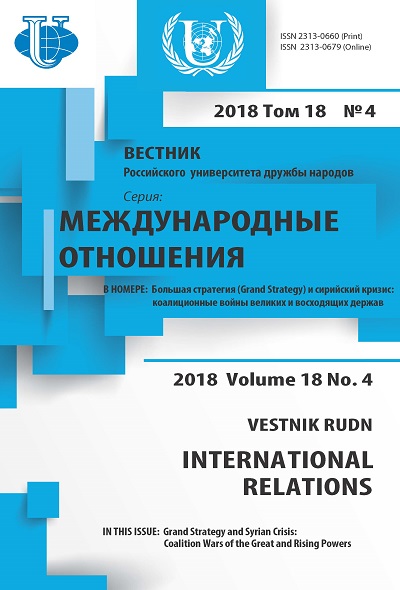The Bundeswehr Usage in the Struggle against ISIS - A Part of Western Coalition?
- Authors: Trunov P.O.1
-
Affiliations:
- Institute of Scientific Information on Social Sciences of Russian Academy of Science
- Issue: Vol 18, No 4 (2018): Grand Strategy and Syrian Crisis: Coalition Wars of the Great and Rising Powers
- Pages: 806-822
- Section: THEMATIC DOSSIER
- URL: https://journals.rudn.ru/international-relations/article/view/20325
- DOI: https://doi.org/10.22363/2313-0660-2018-18-4-806-822
- ID: 20325
Cite item
Full Text
Abstract
In the middle - second half of 2010s the Euro-Atlantic community faces with the necessity to struggle against international terrorism at the huge arc of unstable states including Mali, Libya, Syria, Iraq and Afghanistan. Unlike the first Western coalition (2001-2014) designed to fight al-Qaeda, focused on the struggle against ISIS the second Western coalition does not become the unifying mechanism of a significant part of anti-terrorist military efforts by Western countries. The article covers the reasons of this tendency on the example of Germany as the emerging power. The key methods of the investigation are the exploration of the important military steps (contingents’ deployment, the change of their tasks and the number of troops) in the format of event-analysis and comparative analysis. The paper aims at exploration of the features of military tools’ usage by Germany in the struggle against international terrorism in conjunction with the activity of the second Western coalition. The article considers the reasons of the late German joining the activity of the second coalition at the Syrian and Iraqi theatres of war. In this regard the scientific research covers the main forms of mostly non-military Bundeswehr usage in Mesopotamia and focuses on the cooperation with France. The article also explores the determination of these tendencies. The paper pays attention to German military build-up under NATO activity in Afghanistan and shows that the reasons of it are the strengthening ISIS positions in the country and the failures of Germany and its ISAF partners in the process of Afghan security forces creation in 2002-2014. The scientific research explores the forms of Bundeswehr usage for the struggle against international terrorism at the phone of extension of the areas of this activity at the continent. The author tries to create the scheme of Bundeswehr usage for the struggle against ISIS and its friendly oriented forces at the arc of unstable states from Mali to Afghanistan. The article concludes about the contours of German perspective military presence in the countries which are going on the road of internal stabilization.
Keywords
About the authors
Philipp Olegovich Trunov
Institute of Scientific Information on Social Sciences of Russian Academy of Science
Author for correspondence.
Email: 1trunov@mail.ru
PhD in Political Science, Senior Researcher, Department of Europe and America, Institute of Scientific Information on Social Sciences of Russian Academy of Science
References
- Arzamanova, Т.V. (2011). Germany’s Position during the Libyan Crisis—2011: A New Foreign Policy Strategy or pre-Election Maneuver? European Security: Events, Assessments, Forecasts, 26(42), 11—15. (in Russian).
- Five Years of German PRTs in Afghanistan: an Interim Stocktaking from the Angle of the German Aid Organizations (2009). Berlin, VENRO (Association of German development NGOs).
- Frankreich, Deutschland und die EU in Mali. Chancen, Risiken und Herausforderungen (2015). Brüne St. (Hrsg.). Baden-Baden: Nomos.
- Glatz, R., Hansen W., Kaim M. & Votrrath J. (2018). Die Auslandseinsätze der Bundeswehr im Wandel. Stiftung Wissenschaft und Politik. Berlin.
- Hanisch, М. (2015). A New Quality of Engagement Germany’s Extended Military Opera-tion in Northern Mali. Bundesakademie für Sicherheitspolitik. Security Policy Working Paper, N 8.
- Hett, J. (2005). Provincial Reconstruction Teams in Afghanistan. Das amerikanische, britische und deutsche Modell. Berlin, Zentrum für Internationale Friedenseinsätze.
- Hochwart, M. A. (2009). The provincial reconstruction teams in Afghanistan — a model for future nation-building operations. Kansas: United States Army Command and General Staff College Fort Leavenworth, School of Advanced Military Studies.
- Kamp, K.-H. (2016). Attack on the West: What is the Strategy of ISIL? Bundesakademie für Sicherheitspolitik. Security Policy Working Paper. N 21.
- Klute, G. (2013). Tuareg-Aufstand in der Wüste. Ein Beitrag zur Anthropologie des Krieges und der Gewalt. Mit einem Geleitwort von Trutz von Trotha. Köln: Rüdiger Köppe Verlag.
- Korgun, V.G. (2004). History of Afghanistan. Moscow: Kraft +. (in Russian).
- Mezentsev, S.V. (2014). Domestic and International Political Aspects of Crisis in Mali and French Military Operation ”Serval”. Moscow University Journal of World Politics, 1, 3—28. (in Russian).
- Mikhaylin, K.N. (2009). FRG and NATO in Afghanistan (2001—2008). Izvestia: Herzen University Journal of Humanities & Science, 101, 22—27. (in Russian).
- Noetzel, T. & Rid, Th. (2009). Germany’s Options in Afghanistan. Survival, 51, 71—90. doi: 10.1080/00396330903309865.
- Novikova, O.N. (2014). “Hard” and “Soft” Power of the West in Today’s Afghanistan. Actual Problems of Europe, 3, 38—58. (in Russian).
- Paul, M. (2009). CIMIC in the ISAF Mission. Berlin, Stiftung Wissenschaft und Politik.
- Schwarzbuch. Kritisches Handbuch zur Aufrüstung und Einsatzorientierung der Bundeswehr (2016). Berlin: Rosa-Luxemburg-Stiftung und Fraktion die LINKE.
- The Bundeswehr on Operations: Publication to Mark the 15th Anniversary of the First Parliamentary Mandate for Armed Bundeswehr Missions Abroad (2009). Berlin, Federal Ministry of Defense.
- Vlasov, N.A. (2016). Lessons of the Hindu Kush: the Mission of the Bundeswehr in Afghanistan and its Impact on German Security Policy. Vestnik of Saint Petersburg University. Series 6. Political science. International relations, 3, 108—121. (in Russian). doi: 10.21638/11701/spbu06.2016.309.
- Von Bredow, W. (2015). Sicherheit, Sicherheitspolitik und Militär. Wiesbaden: Springer Fachmedien.
- Werner, L. (2014). The PRT Kunduz: An Unsuccessful Command Structure. Combating Terrorism Exchange Journal, 4(2), May. URL: https://globalecco.org/the-prt-kunduz-an-unsuccessful-command-structure (accessed: 15.08.2018).
Supplementary files










